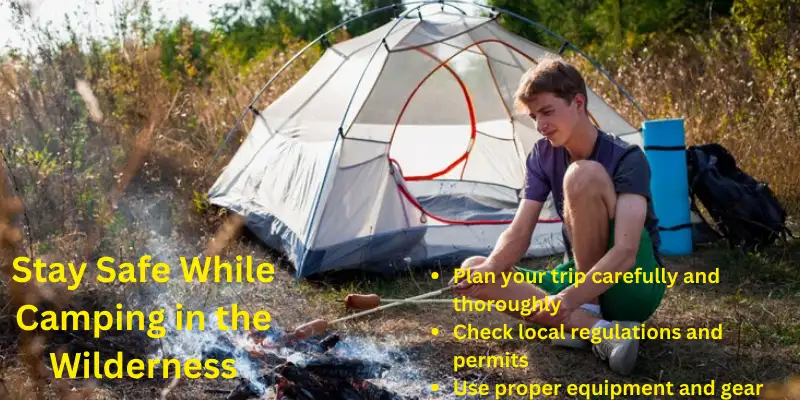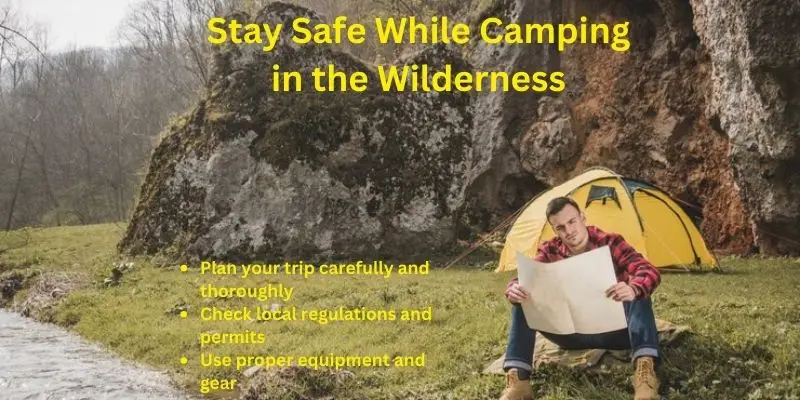10 Crucial Tips for Stay Safe While Camping in the Wilderness
Updated: 8 Aug 2024
263
Camping in the wilderness can be an exhilarating experience, offering a chance to reconnect with nature and challenge oneself in a different environment. Stay Safe While Camping in the Wilderness is a great way to relax, enjoy nature, and make awesome memories. But it’s important to be careful, even if you’re an experienced camper. Safety should always be your top concern.
To help you have a stress-free and enjoyable best camping destination, we’ve put together 10 crucial tips that will equip you to handle anything the wilderness throws your way. From getting ready to actually being in the wild, this guide will help you stay safe and have fun camping. We’ll cover everything you need to know to enjoy your outdoor camping without worries. However, it’s essential to prioritize safety to ensure a positive and incident-free adventure. In this guide, we’ll share critical tips and practical advice to reduce the risks while enjoying the great outdoors.
Tips to Stay Safe While Camping in the Wilderness
Here are some tips of staying safe while camping in the wilderness:
1. Plan your trip carefully and thoroughly
It’s crucial to research and plan your camping trip thoroughly before heading out into the wilderness. This includes determining the location, weather conditions, necessary equipment, and emergency procedures.
2. Check local regulations and permits
Some areas may have specific regulations or require permits for camping. It’s essential to familiarize yourself with these regulations to avoid potential legal issues.

3. Use proper equipment and gear
Make sure to use high-quality, durable equipment and gear that is suitable for the environment you’ll be camping in. This includes a sturdy tent, sleeping bags, cooking supplies, a first aid kit, and appropriate clothing.
4. Pack enough food and water
It’s really important to pack enough food for your whole camping trip. Make sure to bring food that won’t go bad easily, like canned goods or energy bars. You’ll also need lots of clean water to drink. If you can’t carry enough, make sure there’s a safe place nearby to get water. You can use camping essentials for women also to enjoy camping.
5. Tell someone about your plans
Before leaving for your camping trip, make sure to inform a friend or family member about your itinerary and expected return date. This way, someone will know to alert the authorities if you don’t return as scheduled.
6. Stay aware of your surroundings
While camping, it’s crucial to be aware of your surroundings at all times. Pay attention to any changes in weather conditions, animal activity, or potential environmental hazards.
7. Practice fire safety
If you plan on having a campfire, make sure to follow proper fire safety measures. This includes clearing a safe area for the fire, keeping it contained, and properly extinguishing it before leaving.
8. Respect the Wild Animals
Remember, you’re a visitor to the animals’ home when you’re camping. It’s important to be kind to them. Don’t bother the animals or try to feed them. Let them live their lives peacefully.
9. Be prepared for emergencies
Despite careful planning, emergencies can still happen. Make sure to have a first aid kit and know basic first aid procedures. It’s also essential to have a plan for communication and emergency evacuation if needed.
10. Leave no trace
Finally, always remember to leave the campsite as you find it. This means properly disposing of trash, not damaging any natural surroundings, and leaving everything in its place.
Preparing for Your Trip for Camping in the Wilderness
- Inform Someone: Before you head out, tell a trusted person about your camping location and expected return time.
- Weather Forecast: Check the latest weather conditions and equip yourself with gear that matches the forecast.
- First Aid Kit: Bring a well-stocked first aid kit and familiarize yourself with its contents and their use.
During Your Camping Trip in the Wilderness
- Water and Food: Ensure you have an adequate supply of water and food. Pack extra provisions in case of unforeseen delays. You can use Camping Crockpot Meals.
- Local Wildlife: Educate yourself on local fauna. Know how to safely interact with wildlife and what to do in an encounter.
- Stay on the Trail: To minimize the risk of getting lost, remain on clear paths and maintain an awareness of your surroundings.
- Camp Setup: Choose a campsite at least 200 feet away from lakes or rivers to protect water sources and reduce the risk of flooding. You can enjoy the Pontoon Boat Camping experience.
Dealing with Emergencies While Camping Alone in the Wilderness
| Scenario/Activity | Instructions |
|---|---|
| Lost Camper Scenario | Stay put to avoid getting further off track and increase your chances of being located. |
| Use a whistle or mirror to send signals and make a visible distress signal in a clearing. | |
| Wildlife Encounters | Stay calm, make no sudden movements, and retreat slowly while facing the animal. |
| Fight back in an aggressive bear situation, focusing on the eyes and nose. | |
| For snakes, wear protective clothing. If bitten, keep the wound below the heart level and seek immediate medical attention. | |
| Fire Creation | Dry off kindling under your clothing if needed, use fire-starters, and build a stable platform to start the fire. |
| First Aid | Treat cuts and burns promptly with clean water, antiseptic, and proper bandaging to avoid infection. |
Campsite and Environmental Care in Wilderness Camping
- Location Matters
- Fire SafetyFood Storage
- Leave No Trace
- Hazards Awareness

Safety Tips for Camping in the Wilderness
- Familiarize yourself with any potential hazards or dangers in the area, such as poisonous plants or dangerous animals.
- Always carry a map and compass, and know how to use them to navigate.
- If you plan on hiking, make sure to wear appropriate footwear and bring enough water and snacks.
- In case of a medical emergency, make sure to have any necessary medication and contact information for nearby medical facilities.
- Know how to identify and treat common outdoor injuries, such as burns, cuts, or insect bites.
- If you encounter wildlife, keep a safe distance and avoid approaching or provoking them.
- Be mindful of other campers in the area and respect their space and privacy. You should 5 must-know facts about camper shell for Jeep Gladiator that will transform your adventures.
- Keep your campsite clean to avoid attracting animals. Store food in sealed containers or hang it from a tree branch away from your tent.
- Before leaving, double-check that all fires are completely extinguished and any trash is properly disposed of.
Camping In The Gila Wilderness
| Feature/Activity | Description |
|---|---|
| Location | Southwestern New Mexico, featuring diverse landscapes such as rugged mountains and deep canyons. |
| Water Activities | Gila River offers fishing, kayaking, and refreshing swims. |
| Historical Sites | Ancient Native American ruins, including the Gila Cliff Dwellings. |
| Hiking Trails | Variety of trails ranging from easy walks to challenging backcountry routes. |
| Wildlife Viewing | Opportunities to see elk, deer, black bears, and various bird species. |
| Camping Style | Primitive camping sites for a true wilderness experience; pack in and out all supplies. |
| Multiple trailheads are available; some routes require high-clearance vehicles for entry. | Required for camping, obtainable through the local ranger station. |
| Best Seasons to Visit | Spring and fall for mild temperatures, though each season offers unique experiences. |
| Accessibility | Multiple trailheads available; some routes require high-clearance vehicles for entry. |
What Are the Key Differences Between Camping in the Allagash Wilderness and Solo Wilderness Camping?
| Feature/Activity | Camping in the Allagash Wilderness Waterway | Solo Camping in the Wilderness |
|---|---|---|
| Location & Accessibility | Northern Maine, USA; accessible via waterways and entry points. | Varies widely; involves long hikes, off-road driving, or remote flights. |
| Shelter & Sleeping Gear | Lightweight tent, sleeping bag, pad suitable for riverside camping. | Ultralight tent or bivy sack, high-insulation sleeping bag, emergency blanket. |
| Navigation & Water | Waterproof maps, compass, GPS, water filter, purification tablets. | Topographic maps, compass, GPS, advanced water filter, purification tablets. |
| Cooking & Food Storage | Lightweight tent, sleeping bag, and pad suitable for riverside camping. | Compact stove, multi-fuel options, compact cookware, bear canister. |
| Wildlife & First Aid | Frequent sightings of moose and aquatic birds; comprehensive first aid kit. | Lightweight tent, sleeping bag, and pad suitable for riverside camping. |
| Experience & Companions | Group trips and family-friendly; meditative paddling rhythms and social environment. | Portable stove, lightweight cookware, bear-proof containers, or bags. |
Pros and Cons of Stay Safe While Camping in the Wilderness
| Pros |
|---|
|
| Cons |
|---|
|
Conclusion
The wilderness offers an unparalleled opportunity for adventure, relaxation, and connection with nature. However, it’s essential to approach it with respect and caution. By prioritizing safety, you not only protect yourself but also preserve the delicate ecosystem. From meticulous planning and packing to being mindful of wildlife and weather conditions, every precaution counts. Remember, the thrill of the wild is best enjoyed when you’re prepared and aware. So, pack your bags, ignite your spirit of adventure, and immerse yourself in nature’s embrace – safely.
FAQs
What are the benefits of staying safe while camping in the wilderness?
Staying safe in the wild is important. If you’re safe, you won’t get hurt by animals or bad weather. You’ll also be less likely to have an accident.
What are some potential risks of camping in the wilderness?
You could meet dangerous animals, like bears or snakes. Bad weather, like storms, can also be a problem. And it’s easy to get lost and hurt when you’re far from home.
How can I stay safe from wildlife while camping?
Put your food in a safe place so animals can’t get it. Don’t use things that smell strong because animals might come looking for food. And always follow the rules about keeping safe around animals. Never leave food out where animals can find it.
What precautions should I take to stay safe from natural hazards?
Research the area’s geography and weather patterns, pack appropriate gear for the conditions, and stay informed about potential hazards like flash floods or wildfires.
How can I minimize the risk of accidents while camping?
Practice fire safety, use caution when hiking or exploring, and ensure proper equipment maintenance to reduce the risk of accidents.
Are there specific safety measures for solo campers?
If you’re camping alone, be extra careful. Inform someone about your destination and your expected return time. Bring a way to call for help in case of an emergency. You should also know how to find your way around and how to help yourself if you get hurt.
What should I do if I encounter a dangerous situation while camping?
Remain calm, assess the situation, and take appropriate action, such as seeking shelter, administering first aid, or signalling for help if necessary.
Please Write Your Comments